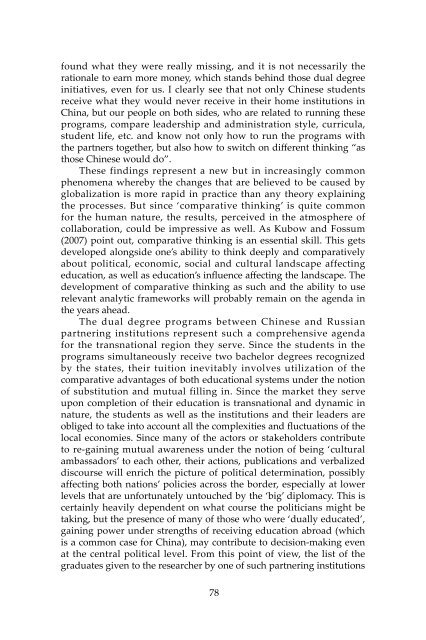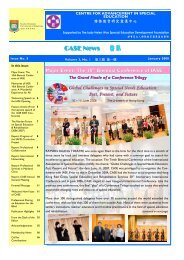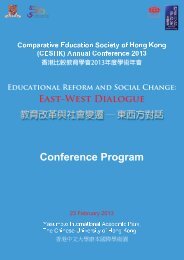Comparative Education Bulletin - Faculty of Education - The ...
Comparative Education Bulletin - Faculty of Education - The ...
Comparative Education Bulletin - Faculty of Education - The ...
Create successful ePaper yourself
Turn your PDF publications into a flip-book with our unique Google optimized e-Paper software.
found what they were really missing, and it is not necessarily the<br />
rationale to earn more money, which stands behind those dual degree<br />
initiatives, even for us. I clearly see that not only Chinese students<br />
receive what they would never receive in their home institutions in<br />
China, but our people on both sides, who are related to running these<br />
programs, compare leadership and administration style, curricula,<br />
student life, etc. and know not only how to run the programs with<br />
the partners together, but also how to switch on different thinking “as<br />
those Chinese would do”.<br />
<strong>The</strong>se findings represent a new but in increasingly common<br />
phenomena whereby the changes that are believed to be caused by<br />
globalization is more rapid in practice than any theory explaining<br />
the processes. But since ‘comparative thinking’ is quite common<br />
for the human nature, the results, perceived in the atmosphere <strong>of</strong><br />
collaboration, could be impressive as well. As Kubow and Fossum<br />
(2007) point out, comparative thinking is an essential skill. This gets<br />
developed alongside one’s ability to think deeply and comparatively<br />
about political, economic, social and cultural landscape affecting<br />
education, as well as education’s influence affecting the landscape. <strong>The</strong><br />
development <strong>of</strong> comparative thinking as such and the ability to use<br />
relevant analytic frameworks will probably remain on the agenda in<br />
the years ahead.<br />
<strong>The</strong> dual degree programs between Chinese and Russian<br />
partnering institutions represent such a comprehensive agenda<br />
for the transnational region they serve. Since the students in the<br />
programs simultaneously receive two bachelor degrees recognized<br />
by the states, their tuition inevitably involves utilization <strong>of</strong> the<br />
comparative advantages <strong>of</strong> both educational systems under the notion<br />
<strong>of</strong> substitution and mutual filling in. Since the market they serve<br />
upon completion <strong>of</strong> their education is transnational and dynamic in<br />
nature, the students as well as the institutions and their leaders are<br />
obliged to take into account all the complexities and fluctuations <strong>of</strong> the<br />
local economies. Since many <strong>of</strong> the actors or stakeholders contribute<br />
to re-gaining mutual awareness under the notion <strong>of</strong> being ‘cultural<br />
ambassadors’ to each other, their actions, publications and verbalized<br />
discourse will enrich the picture <strong>of</strong> political determination, possibly<br />
affecting both nations’ policies across the border, especially at lower<br />
levels that are unfortunately untouched by the ‘big’ diplomacy. This is<br />
certainly heavily dependent on what course the politicians might be<br />
taking, but the presence <strong>of</strong> many <strong>of</strong> those who were ‘dually educated’,<br />
gaining power under strengths <strong>of</strong> receiving education abroad (which<br />
is a common case for China), may contribute to decision-making even<br />
at the central political level. From this point <strong>of</strong> view, the list <strong>of</strong> the<br />
graduates given to the researcher by one <strong>of</strong> such partnering institutions<br />
78
















